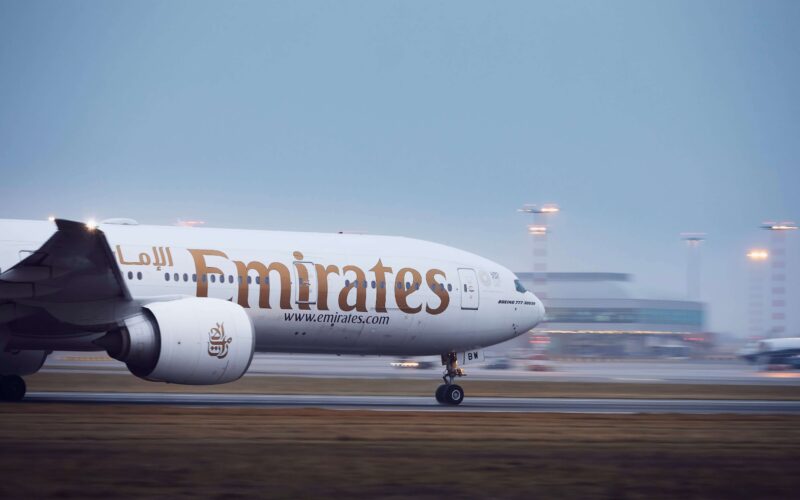Nigeria’s aviation industry has breathed a sigh of relief after the Central Bank of Nigeria (CBN) released $265 million to foreign airlines operating in the country to settle outstanding ticket sales.
The total sum released to foreign airlines comprised $230 million, which was released as a “special FX intervention”, and a further $35 million released through a “Retail SMIS auction”, according to an announcement by the CBN on Twitter.
The CBN hopes that its action will help settle the turbulent situation within Nigeria’s aviation sector, where up to $464 million of foreign airlines revenues were reported to be blocked from repatriation.
“With Friday’s release, it is expected that operators and travelers as well will heave huge sighs of relief, as some airlines had threatened to withdraw their services in the face of unremitted funds for outstanding sale of tickets,” said the CBN in a Sahara Reporters report.
In a statement issued to AeroTime, the International Air Transport Association (IATA) welcomed the Nigerian Government’s release of $265 million of airlines’ blocked funds and urged the full renumeration of the outstanding amounts.
“We will continue to engage with it (Nigerian Government) on expediting the release of the remaining amount, so that airlines can continue providing the connectivity Nigeria requires without disrupting and harming its economy and jobs,” said IATA in the statement.
Emirates tentatively reinstates operations to Nigeria with limited capacity
On August 28, 2022, Emirates notified travel agents that it would reinstate operations to Nigeria, but for a limited time and with limited capacity, according to a BusinessDay report.
“Operations to Nigeria will be reinstated with 4-weekly Lagos (LOS) flights effective 11 September 2022. Lagos flights beyond 30th September will be advised in due course,” said the airline in a travel circular sent to travel agents that was seen by BusinessDay.
The Emirates’ website only shows flight schedules between Dubai International Airport (DXB) and Murtala Muhammed Airport (LOS) from September 11, 2022, to September 30, 2022.
No flight schedules to Abuja Nnamdi Azikiwe International Airport are present on Emirates website after August 31, 2022.
However, Emirates‘ new four-weekly frequency to Lagos is only a fraction of its former schedule of 11 weekly flights to Lagos and iveto Abuja, Nigeria.
Sighs of relief, but will that be enough to keep airlines from leaving?
The news of the CBN transaction follows reports detailing rising tensions as foreign airlines were positioning to exit Nigeria’s market over difficulties in repatriating their revenues from ticket sales.
In a letter addressed to Nigeria’s Minister of Aviation, Hadi Sirika, dated July 22, 2022, Emirates said it had “no choice” but to take action in reducing its operations to the West African country to mitigate the “continued” operational losses which the airline revealed amounted to $10 million every month.
The Gulf carrier was one of the first airlines to take acute action after announcing its decision to suspend all of its flights to and from Nigeria from September 1, 2022. A few weeks prior, the airline had announced plans to reduce flights to destinations in Nigeria from August 15, 2022 over the revenue repatriation issue.
However, the Gulf carrier noted that it would re-evaluate its decision if there was a positive development in Nigeria.
British Airways seemed to be the next in line to adjust its operations to and from Nigeria after issuing a notice to passengers in mid-August outlining its plans to implement full ticket fares for services to Nigeria.
Local Nigerian media, Punch, reported on the notice which read: “Good afternoon. Please be informed that information reaching us from BA indicates that the airline is changing to full fares F, J, W and Y any moment from now. Kindly let (us) issue any pending tickets to avoid fare increase.”
Kingsley Nwokeoma, president of the Association of Foreign Airlines and Representatives in Nigeria, commented on the growing probability of foreign airlines exiting the country in the Punch report.
“This is just the beginning. It is over $1 billion dollars that is being held and they [foreign airlines] cannot repatriate it. If other countries are like Nigeria, there will not be any industry because this money is used for maintenance. Even the money used to pay their staff in Nigeria is coming from other climes,” said Nwokeoma.
Nwokeona also commented that difficulties with revenue repatriation were a long-standing issue in Nigeria, and that more airlines would follow Emirates’ lead if nothing was done.
Expanding on the British Airways travel fares hike, Nwokeona said: “Just like Emirates did, they will first of all cut their flights into Nigeria and they will look at it holistically again and if it is not working out, then it’s not working out. This did not start today. It started over the years and the government is not doing anything.”
IATA hopeful African states will renumerate trapped revenues
IATA told AeroTime that it was hopeful that other African states would follow suit and release trapped airline ticket revenues similar to Nigeria’s action.
The association reported that, as of May 2022, a total of $1.6 billion in funds was blocked by 20 countries across the globe, of which 67% ($1 billion) was attributed to 12 African countries.
Countries among the list include Zimbabwe – $100 million, Algeria – $96 millioin, Eritrea – $79 million, and Ethiopia – $75 million.
“We encourage other countries, in Africa and elsewhere, that are blocking the repatriation of foreign airlines’ funds, to follow Nigeria’s example and release the money they are withholding,” said IATA in the statement issued to AeroTime. “Without it, airlines cannot afford to serve those countries. This would be detrimental to the people and businesses that depend on the market connectivity those airlines provide.”
The association added: “IATA speaks and leads the industry on matters of common interest. While IATA cannot speak for individual airlines, we hope the release of blocked funds with assurances and safeguards to prevent a recurrence, will persuade affected carriers to continue serving Nigeria.”

